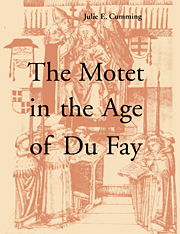Book contents
- Frontmatter
- Contents
- List of tables
- List of musical examples
- Acknowledgments
- Notes to the reader
- Introduction
- Part I Models and methods
- 1 Approaches and analogies
- 2 Subgenre, interpretation, and the generic repertory
- 3 Fifteenth-century uses of the term “motet”
- Part II Motets in the early fifteenth century: the case of Bologna Q15
- Part III Motets in the mid-fifteenth century: the case of the Trent Codices
- Conclusion
- Appendix: Widely disseminated motets
- Notes
- Bibliography of books and articles
- Modern editions of music
- Sources and sigla
- Notes on the index of works
- Abbreviations for subgenre identifications
- Index of works
- General index
1 - Approaches and analogies
Published online by Cambridge University Press: 22 September 2009
- Frontmatter
- Contents
- List of tables
- List of musical examples
- Acknowledgments
- Notes to the reader
- Introduction
- Part I Models and methods
- 1 Approaches and analogies
- 2 Subgenre, interpretation, and the generic repertory
- 3 Fifteenth-century uses of the term “motet”
- Part II Motets in the early fifteenth century: the case of Bologna Q15
- Part III Motets in the mid-fifteenth century: the case of the Trent Codices
- Conclusion
- Appendix: Widely disseminated motets
- Notes
- Bibliography of books and articles
- Modern editions of music
- Sources and sigla
- Notes on the index of works
- Abbreviations for subgenre identifications
- Index of works
- General index
Summary
The motet in the fifteenth century poses problems of categorization, genre and history. What kind of a category is the motet in the fifteenth century? How can a genre have any communicative function when it is so amorphous? How can we explain its transformation over the course of the century? While searching for an approach or methodology that would allow me to deal with these problems, I read Alastair Fowler's useful discussion of literary genre theory, Kinds of Literature (1982). I was struck in particular by one passage:
Just as “lyric” has assimilated other short poetic kinds, making them all subgenres of lyric, so “the novel” has assimilated other kinds of prose fiction. A genre so comprehensive can have but a weak unitary force. Indeed the novel has largely ceased to function as a kind [genre] in the ordinary way.
“Yes!” I said – “that's just like the motet” – and I immediately adapted Fowler's passage to make it apply:
The motet in the fifteenth century assimilated many of the kinds of Latin-texted polyphony. A genre so comprehensive can have but a weak unitary force. Indeed the motet largely ceased to function as a genre in the ordinary way.
Fowler's quotation continues:
Its minimal specification has even been stated as “an extended piece of prose fiction” – a specification in which external form appears, but only as “extended” and “prose.” Within this enormous field, the novel in a stronger sense – the verisimilar novel of Austen and Thackeray, which many would consider the central tradition – is now only one of several equipollent forms.
Information
- Type
- Chapter
- Information
- The Motet in the Age of Du Fay , pp. 7 - 23Publisher: Cambridge University PressPrint publication year: 1999
